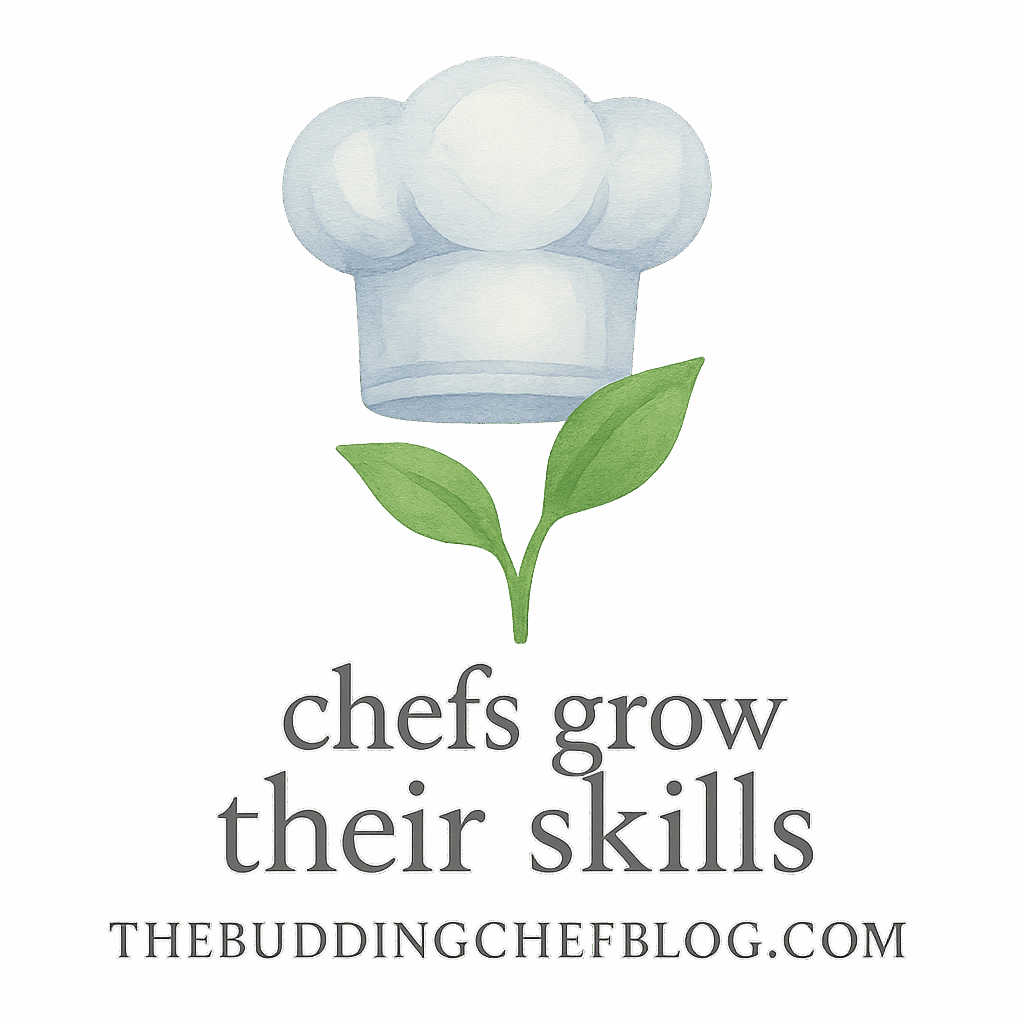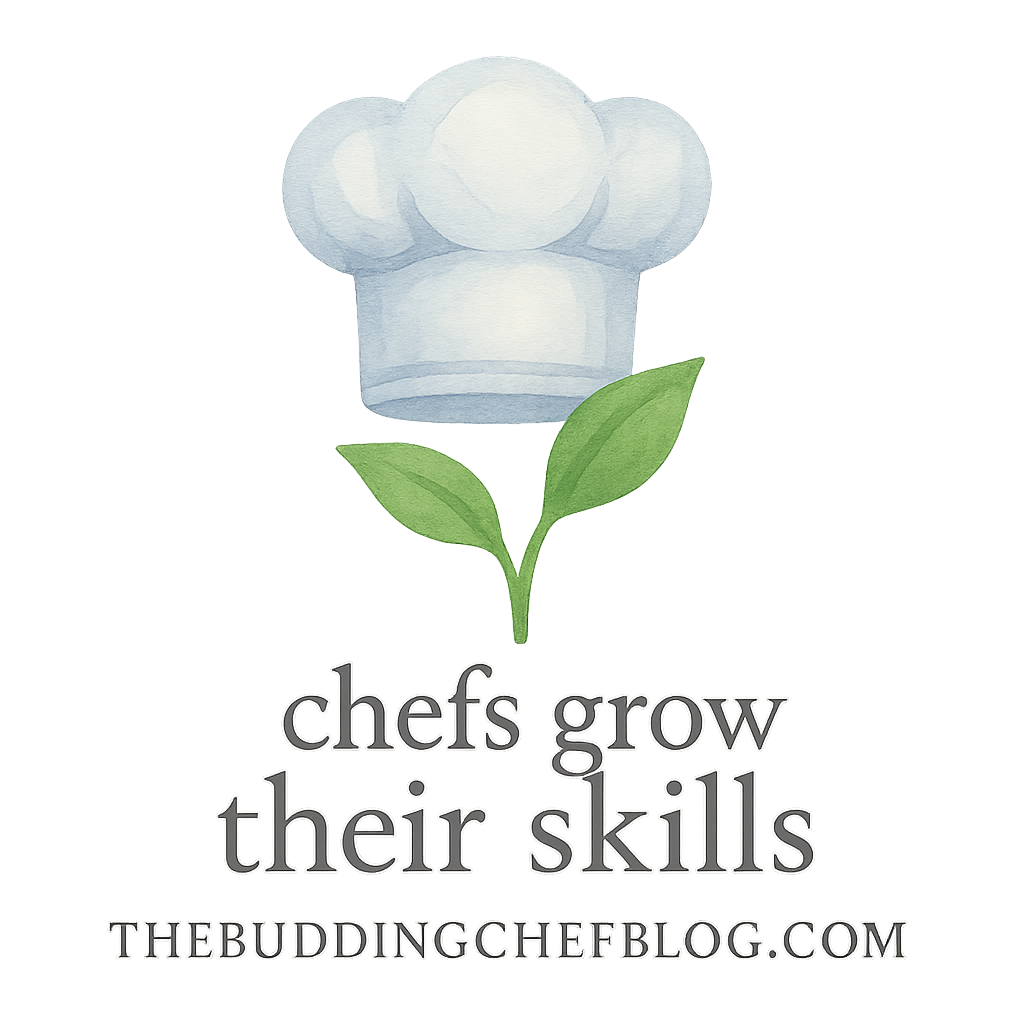So, you’ve caught the cooking bug — maybe you’ve binged some cooking shows or spent hours scrolling through food blogs like The Budding Chef Blog. You’re ready to dive into the kitchen, but where do you start? Cooking is an art, a science, and above all, a skill that improves with practice. The good news? You don’t need a professional kitchen or expensive gadgets — your own kitchen is the perfect classroom.
In this guide, we’ll explore 10 ways beginner chefs can practice at home — practical tips to level up your skills while having fun. Let’s roll up our sleeves and get cooking!
1. Master Basic Cooking Techniques
Why Start With the Basics?
Think of cooking like learning to play an instrument — before you can master a symphony, you need to nail the scales. The same goes for cooking. Mastering basic cooking techniques — like sautéing, roasting, boiling, and braising — builds a solid foundation. Once these skills become second nature, you’ll tackle more complex dishes with ease.
How to Practice Daily
Pick one technique to focus on each week. For instance, practice sautéing onions perfectly or roasting vegetables until they’re caramelized. Repetition helps cement these skills — and hey, you’ll get to eat the results!
2. Get to Know Your Ingredients
Building Ingredient Knowledge
Great cooking starts with understanding your ingredients. Study the textures, flavors, and cooking methods of herbs, spices, meats, and produce. The Ingredient Knowledge section at The Budding Chef Blog is a goldmine of info.
Seasonal Ingredient Practice
Shop local farmers’ markets or grocers for seasonal ingredients. Challenge yourself to cook with what’s in season — it keeps things fresh and builds adaptability.
3. Perfect Your Knife Skills
Essential Knife Techniques to Learn
Good knife skills save time, reduce waste, and improve safety. Focus on learning:
- Chopping
- Dicing
- Julienning
- Mincing
Daily Knife Practice Ideas
Dedicate 10 minutes a day to practice — chop carrots, slice onions, or mince garlic. Over time, you’ll notice improved precision and speed.
For tips on choosing the right kitchen tools & equipment, check out this essential guide.

4. Experiment With New Recipes
How New Recipes Help Build Confidence
Trying new recipes teaches technique, flavor pairing, and timing. It also boosts your confidence! Check out the Recipe Practice section for ideas.
Choosing Beginner-Friendly Recipes
Start with recipes tagged as #beginner or #affordable. Look for those with step-by-step instructions and minimal ingredients.
5. Set Up a Functional Kitchen Space
Importance of Good Kitchen Tools & Equipment
You don’t need fancy gadgets, but solid kitchen tools — like sharp knives, a cutting board, and quality pots & pans — make all the difference.
Tips for Organizing Your Kitchen
Keep tools within reach. Group similar items together. Label your pantry. An organized kitchen saves time and reduces frustration — making practice more enjoyable.
Explore more on kitchen tools & equipment to set yourself up for success.
6. Practice Meal Planning
Why Meal Planning Helps Beginner Chefs
Meal planning builds consistency and helps you avoid decision fatigue. You’ll waste less food, save money, and practice more regularly.
How to Get Started with Meal Planning
Use a simple planner or app. Pick three recipes to cook this week. Consider using tags like #meal-planning for inspiration.
7. Learn From Your Mistakes
Common Mistakes Beginner Chefs Make
- Overcooking meats
- Under-seasoning
- Crowding the pan
- Ignoring recipe steps
Turning Mistakes Into Learning Opportunities
Mistakes = learning. Instead of feeling discouraged, jot them down. What went wrong? How can you adjust? The #mistakes tag is full of helpful insights from fellow beginner chefs.
8. Develop Consistent Cooking Habits
Creating a Routine
Consistency breeds improvement. Block off two or three evenings a week to cook, even if it’s just a quick dish.
Building Long-Term Cooking Success
Track your progress. Build on small wins. Incorporate new skills each month. For more, check out #habits for tips from experienced chefs.
9. Cook for Family and Friends
Why Feedback Matters
Cooking for others provides valuable feedback and boosts confidence. Plus, it’s fun to share your passion.
Fun Ways to Share Your Cooking
Host a themed dinner, try a potluck, or send friends home with leftovers. #Cooking is a community activity — the more you share, the more you learn!
10. Track Your Progress and Celebrate Success
How to Journal Your Cooking Journey
Keep a cooking journal or photo diary. Note what worked, what didn’t, and what you’d change. It’s inspiring to look back and see how far you’ve come.
Celebrating Milestones
Did you finally nail that tricky soufflé? Celebrate it! Share your progress with the #success community.
Conclusion
There you have it — 10 ways beginner chefs can practice at home and build skills, confidence, and creativity in the kitchen. Remember, practice doesn’t need to be perfect. Every meal is an opportunity to learn.
For more tips on growing your cooking skills, check out:
And explore popular tags like #practice, #improvementchefs, and #essentialschefs. Happy cooking!
FAQs
Q1: How often should beginner chefs practice at home?
Aim for at least 2–3 times a week. Regular practice builds confidence and skills.
Q2: What are some affordable tools beginner chefs should invest in?
Start with essentials: a good chef’s knife, cutting board, pots, pans, and basic utensils. Find budget-friendly ideas here.
Q3: How do I stop feeling overwhelmed as a beginner chef?
Take it step by step. Focus on one technique or recipe at a time. The #beginnerchefs tag has lots of supportive content.
Q4: What should I do if a recipe goes wrong?
Learn from it! Cooking is trial and error. Use the #mistakes section to find common pitfalls.
Q5: How do I practice cooking if I’m short on time?
Start with simple dishes or prep ingredients in advance. Even 15 minutes in the kitchen adds up.
Q6: Is it worth keeping a cooking journal?
Absolutely! Tracking your progress helps you reflect and improve — and makes celebrating successes more rewarding.
Q7: Where can I find more practice resources?
Head to The Budding Chef Blog and explore topics like Basic Cooking Techniques, Professional Growth, and Recipe Practice.


